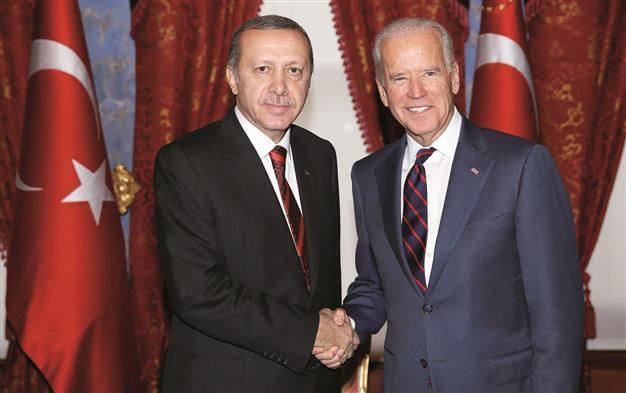Turkey, US agree on Iraq but disagree on Syrian front in anti-ISIL fight
Murat Yetkin

Turkish President Erdoğan (L) shakes hands with US Vice President Biden, Nov. 22. AA Photo
Neither Turkish President Tayyip Erdoğan nor U.S. Vice President Joe Biden were able to convince each other on their priorities in the Syrian front of the fight against the Islamic State of Iraq and the Levant (ISIL) during an almost four-hour meeting in Istanbul on Nov. 22, according to ranking Turkish officials.They both agree that ISIL has to be fought, and they both agree that without Bashar al-Assad leaving power there will be no rest in the country. But Turkey declines to be a fully-fledged part of the anti-ISIL coalition unless the U.S. agrees to adopt an “integrated strategy” that also targets the removal of al-Assad from power. The U.S. declines to do this, and also declines to call for a no-fly zone in Syrian air space to stop air attacks on the Syrian armed opposition and provide protection for refugees.
As a result, Biden returns empty handed to Washington regarding the opening of the strategic air base İncirlik in southern Turkey, Turkish participation in air strikes against ISIL, and wider scale military cooperation.
However, Turkey will continue to cooperate with the U.S. and other members of the coalition against ISIL on the “tactical level” as one diplomatic source put it. That means cooperation against foreign fighters, on intelligence sharing, and on border security will be “stepped up,” as well as cooperation regarding the Kurdish-populated Syrian town of Kobane (Ayn al-Arab), which is currently under ISIL attack.
Despite the “agree to disagree” situation about al-Assad on the Syrian front, Turkey and the U.S. see the Iraqi front of the fight against ISIL from the same lenses, Turkish sources say. Erdoğan and Biden agree that the rise of ISIL started to accelerate after ISIL took Mosul, so efforts should be “aimed at liberating Mosul.” The two countries agreed to support Baghdad’s plan to set up a new force consisting of mainly Sunni elements near Mosul, while Turkey has vowed to train those forces, as well as the Kurdish Peshmargas, against ISIL.
“We have no problem in fighting against ISIL,” one ranking source said regarding the Turkish government’s position on the discrepancy with the U.S. “Erdoğan told Biden that he did not even consider them to be Muslims. Also, we don’t think that the U.S. is in favor of al-Assad staying in power, just because it doesn’t target him now. We understand each other.”
Ankara believes that along with having a mandate from the Republican-controlled Congress only against ISIL, not al-Assad, the U.S. administration might be hesitant about voicing al-Assad as a target because of the ongoing nuclear talks with Iran. “The Americans wouldn’t like Iran to come up with this item to ruin the talks, with their deadline on Nov. 24,” the diplomatic source told the Daily News. “Also, they wouldn’t like pro-Iran Shiite groups fighting against ISIL in Iraq and Hezbollah in Syria to start hitting American targets. We understand that, but we have our own priorities."
Meanwhile, if you are still curious about the “apology crisis” between Erdoğan and Biden, neither of them seemingly mentioned it during their four-hour meeting, as if nothing had happened. This might well be the reason why Biden did not want to take any questions from reporters throughout the entire three-day visit. “We still consider the written White House statement to be the apology,” a source close to President Erdoğan said.











